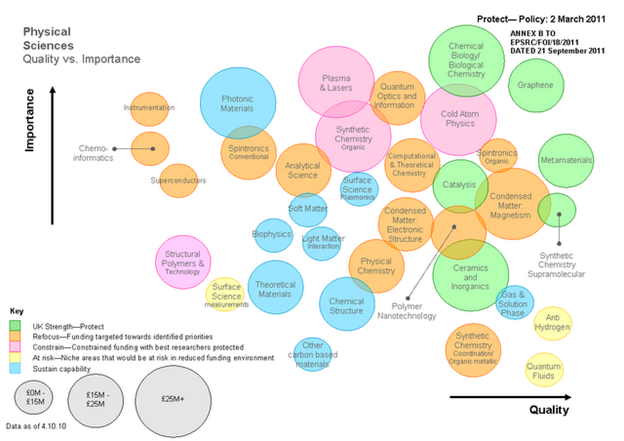I have (regrettably) only just discovered Paul Clarke’s blog http://shear-lunacy.blogspot.com/2011/09/bourne-incredulity.html . Paul is a synthetic chemist and over this year has challenged science policy funding, especially by the UK’s EPSRC. He has mobilised opinion by collecting signatories to letters to EPSRC and getting the Royal Society of Chemistry to take this seriously (which they now do). It’s a great example of the power of the blogosphere. Continual, concerted action by individuals has a massive effect.
Read Paul’s posts this year (rather than a summary from me). Essentially the EPSRC has abandoned traditional methods of funding (PhD studentships and responsive mode (funding excellent ideas from anyone)) in favour of a metric mumbo-jumbo. EPSRC has decided that it will fund high quality, high importance subjects in “sponsorship” mode. This means, effectively, that they have set themselves up as kingmakers and supporters of the Holy Roman Empire of the chosen, rather than understanding that science comes from everywhere and leads anywhere and the skill is in letting this happen. In times of reduced funding everyone will suffer, but this model selects a few privileged groups and showers the limited wealth on them. The model is defensible within a commercial company aiming for particular markets – it does not work for public science.
Unfortunately it leads to the rule of numbers, and here is the EPSRC graph (“Bourne graph”) of desirability (copied from Paul’s blog). (Since it appears to be a work of fiction it is formally copyrightable but I’ll take that risk).

It has two axes and until the algorithm for coordinates is revealed they remain completely subjective. (There can be valid reasons for using bibliometry to XY-plot disciplines and these include interdisciplinary links as in the MESUR and Eigenfactor projects. But these are descriptive of information flow, not value). Apparently FOI has been invoked to try to get clarity without success. I am not sure it’s on WhatDoTheyKnow and I’ll suggest that.
To play the game, my own discipline of chemoinformatics scores high on importance and ultra-low on quality. OK, I have been critical of chemoinformatics but I doubt that EPSRC is listening to me. Who decided this? And how? There is no evidence that these indicators have any basis. Are they UK or worldwide?
And polymers – another area we have worked in. Low quality (what an arrogant statement to make without justification) and low importance (why did Unilever fund us strategically?).
And although synthetic organic chemistry is of high importance it is being systematically underfunded by EPSRC. The discipline that allows people to create and modify molecules addressing disease, materials, agrochemistry…
The subject which in Dial-A-Molecule EPSRC itself selected as a Grand Challenge.
I have no objection to graphs of this sort being dreamed up in awayday workshops. The problem is that they become hardcoded into policy tools. That certain keywords guarantee that you won’t get funded.
Anyway great kudos to Paul for leading this activity. If I had known I would have signed his letters. He is in a “typical” chemistry post in that extradisciplinary work such as blogging is usually a negative factor. Campaigning takes away time from writing grants and doing research. Challenging the CEO of EPSRC probably doesn’t do you any good in getting funding.